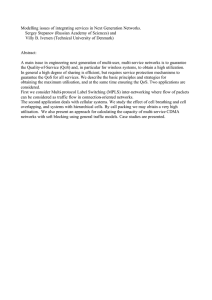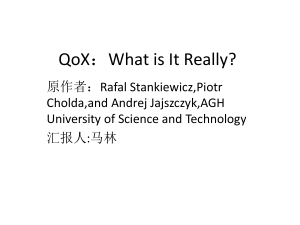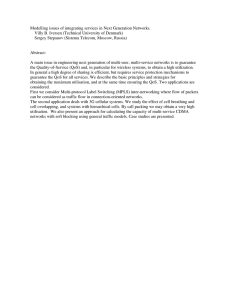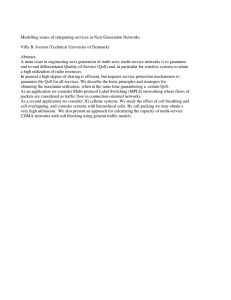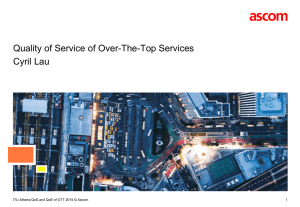Dear distinguished guests, press members and collageous (Dear secretary... ITU-T Study Group 12, Dear board members of ICTA)
advertisement
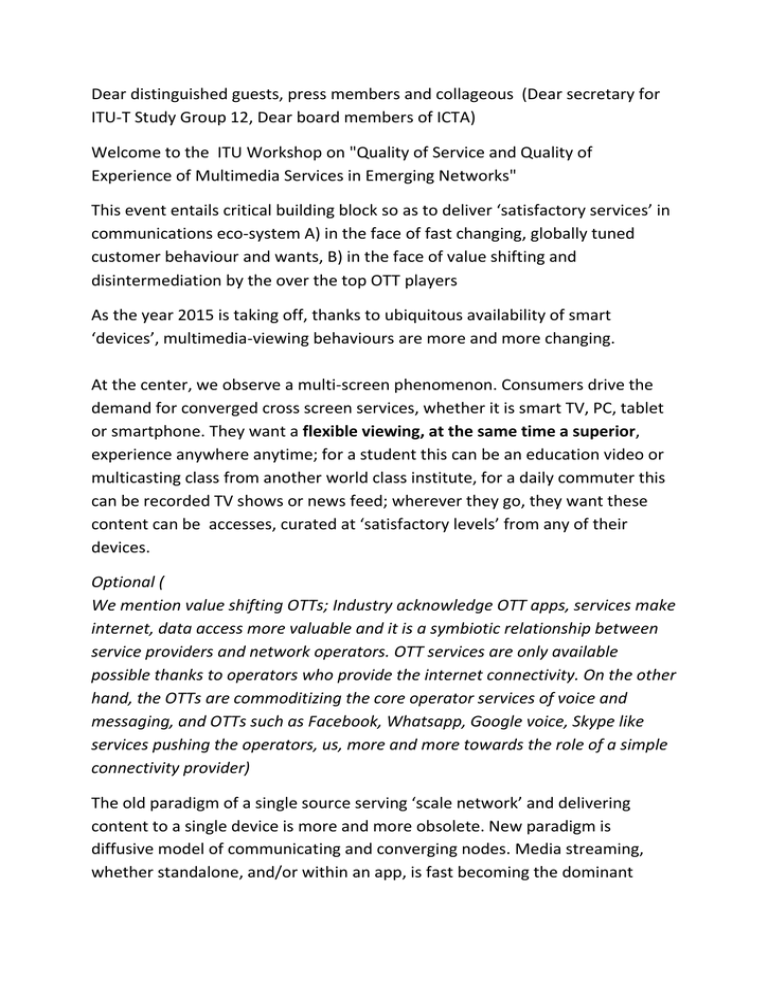
Dear distinguished guests, press members and collageous (Dear secretary for ITU-T Study Group 12, Dear board members of ICTA) Welcome to the ITU Workshop on "Quality of Service and Quality of Experience of Multimedia Services in Emerging Networks" This event entails critical building block so as to deliver ‘satisfactory services’ in communications eco-system A) in the face of fast changing, globally tuned customer behaviour and wants, B) in the face of value shifting and disintermediation by the over the top OTT players As the year 2015 is taking off, thanks to ubiquitous availability of smart ‘devices’, multimedia-viewing behaviours are more and more changing. At the center, we observe a multi-screen phenomenon. Consumers drive the demand for converged cross screen services, whether it is smart TV, PC, tablet or smartphone. They want a flexible viewing, at the same time a superior, experience anywhere anytime; for a student this can be an education video or multicasting class from another world class institute, for a daily commuter this can be recorded TV shows or news feed; wherever they go, they want these content can be accesses, curated at ‘satisfactory levels’ from any of their devices. Optional ( We mention value shifting OTTs; Industry acknowledge OTT apps, services make internet, data access more valuable and it is a symbiotic relationship between service providers and network operators. OTT services are only available possible thanks to operators who provide the internet connectivity. On the other hand, the OTTs are commoditizing the core operator services of voice and messaging, and OTTs such as Facebook, Whatsapp, Google voice, Skype like services pushing the operators, us, more and more towards the role of a simple connectivity provider) The old paradigm of a single source serving ‘scale network’ and delivering content to a single device is more and more obsolete. New paradigm is diffusive model of communicating and converging nodes. Media streaming, whether standalone, and/or within an app, is fast becoming the dominant application on the Internet. In this new world of immersive media viewing, new challenges are emerging for the network supply and demand. It is critical that the behavior and reaction of Consumers, their ‘perceived’ Quality of Experience (QoE) needs to be taken into account when designing the delivery mechanisms for the next-generation of video rich services. Simply, this is required for sustainability ‘communications ecosystem’ as the value shifts . The Internet is becoming the backbone of future communications in an entertainment centric way. QoS is a dual notion. What defines QoS fundamentally? QoS can be parameterized as throughput, delay, delay variation (jitter), loss and error rates, security guarantees, etc, that are acceptable in an application. As such, QoS is a necessarily application specific. Each app, each device, each user, persona context have different QoS requirements. If switching channels for an IPTV system exceed certain threshold in seconds, it may not be satisfactory; for a doctor, telemedicine apps may bear different criteria From a communications service vantage point, we put ‘quality of service’ into three layers: user/application, system and network layers; each layer entails critical QoS and QoE components Optional (Application layer: Frame Rate, Frame Size and Resolution, Response Time Throughput, Security System layer: Buffer Size, Process Priority, Scheduling Policy, Caching Policy Network layer: Bandwidth, Throughput, Bit Error Rate, End-to-End Delay Delay Jitter) Notion of ‘Quality of service’ stems from supplier vantage point, it is about delivery, regulatory bodies interjecting on behalf of consumers sometimes setting the standards; ‘quality of experience’ in today’s world is measured and perceived by the end user; actually they don’t care about kpis, look and feel is more important; and it is context dependent, perception is reality If you are watching penalty kicks in world cup, your perception radar is different; or if you are watching an advertising in the middle of tv series Two different experiences, two different expectations Adaptability is key; As service providers, we tend to converse more and more about these categories; Understand Customer Preferences, Be Proactive rather than Reactive Anticipate failures before they happen, Better understand quality of experience requirements, effectively drive QoS Exploit global trends, exploit Crowd Sourcing opportunities, as such Measuring, Evaluating QoS and QoE are critical aspects of the objective in delivering a resilient and efficient network in today’s reality of multimedia Evaluations are application dependent. User context is an ingredient. The monitoring of bandwidth gain, delay, loss or jitter requirements of applications can be studied using simulations or experiments based on implementation in a real deployment environment. ‘Controlled experiment’s is more and more a key instrument for network service providers İn a practical world, QoS and QoE touch in broader sense net neutrality; it is critically important that stakeholders develop an incentive compatible solution for the sustainability of industry, eco-system. When we think about future, I think, Security, survivability, and manageability are important operational issues to deliver multimedia traffic with a wide range of QoS requirements. Existing management schemes suffer from lack of adaptability. Network dynamics need to be captured in ever adapting QoE Service quality is the bottom-line value proposition of network operators and service providers. It is the end of ‘One size ‘qoS’ fit all era’ for network operators. This workshop is timely, relevant and more important ever given the market and consumer trends especially in the face of OTT player’s vertical integration and their disruptive value proposition. When I glanced through the agenda it covers a rich body of topics which are essential in delivering quality of service across multi-media eco-system; from ‘standardization’ to ‘evaluation’, from ‘measuring web traffic’ to ‘measuring iptv, big data services’ This workshop brings diverse backgrounds from government policy making institutions, regulatory bodies, academics, advisors, communications/media service providers and suppliers across the globe. It is our pleasure to host this workshop in TTG premises. TTG is an active member in ITU across all 3 sessions, ‘radio communications’, ‘standardization’ and ‘development’. Please enjoy the workshop and Istanbul which bridges 2 continents. Thank you

